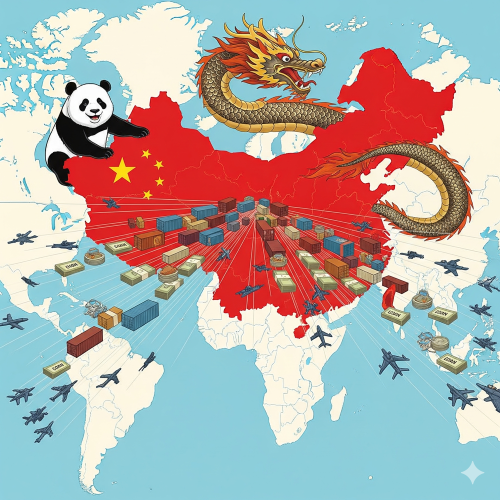How do African leaders balance Chinese partnerships with Western aid and investment offers?

African leaders balance Chinese partnerships with Western aid and investment by leveraging competition between the two to secure better deals, diversify their options, and advance their own national development agendas.
They strategically use the different approaches of China and the West—China's focus on infrastructure and non-interference versus the West's emphasis on governance and conditionality—to their advantage.
This multipolar approach allows them to seek financing for projects that Western countries may not support, while also maintaining ties with long-standing partners.
China's Distinctive Approach: The "No Strings Attached" Model
China's rise as a major partner in Africa has been particularly appealing due to its distinctive approach. The Belt and Road Initiative (BRI), for instance, offers massive, fast-tracked loans for large-scale infrastructure projects like railways, roads, and ports. For African leaders, this model has several key attractions:
-
Non-Interference: China adheres to a policy of non-interference in the internal political affairs of its partners. This is a significant departure from Western aid, which often includes conditionalities related to human rights, democracy, and anti-corruption measures. For leaders facing domestic political challenges, or those who simply wish to pursue their own governance models, this non-interference is a major selling point.
-
Infrastructure Focus: China’s lending is heavily concentrated on physical infrastructure, which is a critical need across the continent. These are tangible, high-impact projects that can be completed relatively quickly and often serve as a visible symbol of a government's commitment to development. The Mombasa-Nairobi Standard Gauge Railway in Kenya and the Addis Ababa-Djibouti Railway are prime examples of this model in action.
-
Speed and Scale: Chinese state-owned enterprises can mobilize capital and labor on a scale and at a speed that Western consortiums often cannot match. This allows for the rapid implementation of projects that could take years, if not decades, to finance and approve through traditional Western institutions like the World Bank or the IMF.
The Western Model: Aid with Conditions and a Focus on Governance
Western aid and investment, largely coordinated through institutions like the IMF, the World Bank, and bilateral development agencies, operate on a different set of principles.
-
Conditional Aid: Western aid is often tied to a "good governance" agenda. This includes demands for fiscal transparency, market-oriented reforms, and improvements in human rights and democratic institutions. While these conditionalities are intended to ensure aid is used effectively and to promote long-term stability, they are often perceived by African leaders as paternalistic and an infringement on their sovereignty.
-
Focus on Social Sectors: Historically, Western aid has prioritized social sectors such as health, education, and poverty reduction. While essential, these areas often do not receive the same level of public attention as a new railway or a modern port. The World Bank, for example, is far more likely to fund a public health program than a new national highway.
-
Private Sector Investment: In recent years, Western nations have shifted their focus to encouraging private sector investment in Africa rather than solely relying on government-to-government aid. Initiatives like the U.S. government's Prosper Africa and the EU's Global Gateway are designed to channel private capital into African markets, but they have been criticized for being slow and lacking the financial scale of China's BRI.
Balancing Act: Strategies of African Leaders
African leaders are not passive recipients of aid but active agents who employ a range of strategies to manage these competing offers.
-
Diversification of Partnerships: The most effective strategy is to avoid over-reliance on a single partner. By engaging with both China and Western nations, African governments can shop around for the best terms for different projects. For example, a country might seek Chinese financing for a major railway project that a Western bank would deem too risky, while simultaneously partnering with a European agency on a public health initiative that aligns with Western aid priorities.
-
Playing Rivals Against Each Other: African leaders can leverage the geopolitical rivalry between China and the West to their benefit. By creating a competitive environment, they can negotiate more favorable terms, including lower interest rates, longer repayment periods, and more local job creation. This strategic positioning allows them to demand more from both sides, as each vies for influence on the continent.
-
Asserting Agency and Sovereignty: African governments are increasingly vocal about their right to choose their own development path. They push back against what they see as a condescending narrative of being "caught in the middle" and instead frame themselves as sovereign nations making rational decisions in their own best interests. By asserting their agency, they can reject terms that are not aligned with their long-term vision.
The long-term implications of this balancing act are still unfolding. While it provides African nations with greater autonomy and options, it also presents challenges, particularly related to debt sustainability and potential over-indebtedness. The key for African leaders will be to maintain a nuanced and pragmatic approach, continuing to diversify their partnerships while ensuring that the terms of engagement, regardless of the source, contribute to sustainable and inclusive economic development for their people.
- Questions and Answers
- Opinion
- Motivational and Inspiring Story
- Technology
- Live and Let live
- Focus
- Geopolitics
- Military-Arms/Equipment
- Ασφάλεια
- Economy
- Beasts of Nations
- Machine Tools-The “Mother Industry”
- Art
- Causes
- Crafts
- Dance
- Drinks
- Film/Movie
- Fitness
- Food
- Παιχνίδια
- Gardening
- Health
- Κεντρική Σελίδα
- Literature
- Music
- Networking
- άλλο
- Party
- Religion
- Shopping
- Sports
- Theater
- Health and Wellness
- News
- Culture

